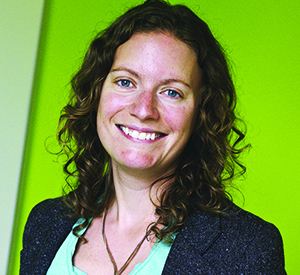
Dr. Erin Fredericks hopes that LGBTQ+ youth who are struggling during the COVID-19 pandemic may find solace by speaking to LGBTQ+ elders who lived through the AIDS epidemic in the 1980s.
This is at the heart of a new research project called, "We’ve Survived Before: An Inter-generational, Youth-led Mental Health Intervention for LGBTQ+ Youth," which is funded by Mental Health Research Canada (MHRC) and the New Brunswick Health Research Foundation (NBHRF).
“Although vastly different, we know that increased social isolation, decreased community connection, and decreased opportunities for identity affirmation were common social experiences for LGBTQ+ people during the AIDS epidemic and are common experiences for LGBTQ+ youth during COVID-19,” Fredericks explains.
“We believe that these similarities will provide a foundation for inter-generational engagement that will support youth in seeing themselves as members of a resilient community with a history of survival during difficult times, and will support LGBTQ+ elders in developing a sense of themselves as valued and knowledgeable members of the LGBTQ+ community.”
Fredericks’ research team includes Nathan Thompson (Canadian Certified Counsellor and Licensed Counselling Therapist), Dr. Ardath Whynacht (researcher), Stel Raven (social worker), Aaron Beaumont (youth research team member), Rick Sharpe (collaborator), and Dr. Kelly Baker (project coordinator).
During the project, LGBTQ+ elders who have lived through the AIDS epidemic are connected virtually with an LGBTQ+ youth leadership team to convey the long history of resilience in the LGBTQ+ community.
Fredericks and her research team will then work with these youth to develop a COVID-19 mental health support program for their younger peers that embodies the values and practices of inter-generational community resilience.
The program will be delivered by the youth leadership team and by staff at Partners for Youth, a provincial not-for-profit. The final bilingual version of the program template will also be available on the Partners for Youth website for use by any LGBTQ+ youth supporting organization in Canada.
Although physical distancing, partial school closures, and uncertainty about the future characterize the experiences of all youth during the COVID-19 pandemic, this places LGBTQ+ youth at increased risk of mental health crises and harm. The Canadian Mental Health Association found that during COVID-19, LGBTQ+ people report worse mental health than their heterosexual and cisgender peers, are three times more likely to attempt self-harm, and are misusing cannabis as a coping mechanism.
Fredericks says researchers at The Trevor Project, an organization providing crisis intervention and suicide prevention services to LGBTQ+ youth, found that during the COVID-19 pandemic, youth-led mental health interventions designed to re-establish social connection, offer sites for identity affirmation, and create a sense of future resilience are necessary to protect the mental health, safety, and lives of LGBTQ+ youth.
“For LGBTQ+ youth, inter-generational connections build a sense of community and allow them to understand themselves as part of a resilient community that has successfully survived difficult times,” Fredericks says.
“During COVID-19, it is important that we build this sense of community connection via distance. Few LGBTQ+ youth in New Brunswick have connections with LGBTQ+ elders who can provide knowledge about the resilience of the LGBTQ+ community…. If we are to successfully empower LGBTQ+ youth in New Brunswick during the COVID-19 pandemic, we must find new ways to support youth in building this sense of community.”
-(2).jpg)
/filters:format(webp)/prod01/stuca/media/stu/site-assets/images/features/STUBSA.jpg)
/filters:format(webp)/prod01/stuca/media/stu/site-assets/images/features/Accessibility-Week-News-Box.jpg)
/filters:format(webp)/prod01/stuca/media/stu/site-assets/images/features/Arts-Matters-News-Box.png)